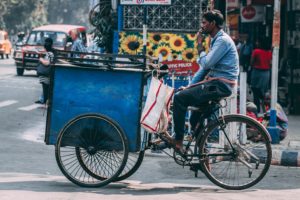Blog
Five Things You May Have Missed in International Development This Month
Written by Sarah Koedijk
September 24, 2018
Had a busy month and feel like you lost touch on what’s happening in international development? Not to worry, we’ve got you covered.
-
The Venezuelan Refugee Crisis – More than 2.3 million people have fled the country since 2014
This month, commentators have deemed Venezuela’s mass migrations a crisis. According to Human Rights Watch, more than 2.3 million people have left the country since 2014. Fleeing from a lack of basic supplies, healthcare and crime and violence, most refugees settle in neighbouring states. For instance, over 1 million have emigrated to Colombia. Many have also settled outside of the region, with as many as 70,000 migrating to the United States. The “Venezuelan Exodus”, has presented the Americas with complex challenges, which demands a concerted regional response.
-
Oral Polio drops linked to paralysis in India
According to a recently published study by the International Journal of Environmental Research and Public Health, India’s oral polio vaccine drives have been hugely successful. As a result, they have helped to make India a polio-free country. However, they have also been responsible for half a million cases of oral polio vaccine-induced paralysis among children below the age of 15. The study found a high correlation between the frequency of immunisation campaigns carried out throughout India, and the number of paralysis cases among the population. Scientists are therefore calling for further research on the issue, optimised vaccine dosage and more frequent immunisation campaigns.
-
A famine is threatening millions of people in the Lake Chad basin
According to reports from the Guardian, 11 million people around the Lake Chad basin are in urgent need of food assistance. Many of the affected are refugees who have been displaced by conflict. Furthermore, many have had limited access to food in their home countries of Nigeria, Chad, Cameroon and Niger. However, with the Lake Chad basin increasingly overcrowded, they are facing increased food insecurity. Indeed, there are issues with the delivery of food aid due to military restrictions and the inaccessibility of settlements. As a result, the international community must ‘double’ its (financial) efforts to mitigate a situation, which could quickly become a humanitarian disaster.
-
Law discriminating against women complicates the reporting of sexual violence in Mauritania
A new Human Rights Watch report found that women who report sexual abuse in Mauritania are often prosecuted for adultery. What’s more, it is often the female victims who end up in prison as opposed to the men who carried out the abuse. Other punishments include flogging and death by stoning. Due to a law enforcement and public health system which has failed to define rape and criminalise sexual violence, many suffer in silence. Campaigners have demanded the reformation of a system, which not only discriminates against women but also protects their perpetrators.
-
Ethiopia’s internal displacement levels surpass all
Internal displacement in Ethiopia has hit a new high. Since the beginning of the year 2018, 1.4 million people have fled from internal conflict. This has led to Ethiopia experiencing the highest levels of violence-related internal displacement, globally. Once displaced, many Ethiopians live in overcrowded camps, which lack access to basic services. Most displaced are economically dependent and many are trapped in a vicious cycle of poverty. However, Ethiopia faces a bright economic outlook, as the second-fastest growing economy on the African continent.
About the Author
Sarah Koedijk is currently completing a MSc in Political Economy of Emerging Markets with the Department of International Development at King’s College London. She is also doing an internship with LIDC. Sarah’s dissertation investigates the effect of land investments on the communities living in Ethiopia’s lowlands.

